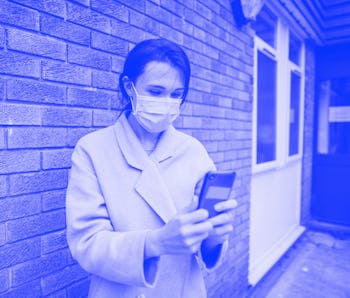Coronavirus
Twitter now labels misleading COVID-19 tweets
The labels are an expansion of Twitter’s broader battle with misinformation.

On Monday, Twitter announced a new feature to stem the tide of potentially harmful, misleading posts about coronavirus on it platform. The company will now label tweets with a “disputed claim” or “misleading information” about COVID-19 accordingly, and the latter will be removed if the post reaches a “severe” level of harmfulness. This is similar to labels Twitter started placing on deepfakes earlier this year.
How the labels work — Twitter is working on continually improving its internal systems to monitor and review misleading COVID-19 tweets. Flagged tweets will be labeled and any attached media won't preview. In more severe cases a warning label that blocks out the entire tweet and allows users to click through to view it will display. And in the worst instance, the tweets will be completely removed from the platform.
Labels will also push people to the equivalent of a coronavirus Twitter Moment or an external website with legitimate coronavirus information. Embedded tweets and tweets viewed when logged out of Twitter might appear without any labels at all, though.
Calling it as it sees it — Labels are assigned to tweets deemed to either carry moderately harmful misleading information or disputed claims. Severely misleading posts in those categories will be removed or receive a warning. If a claim is simply unverified, no action is taken, but Twitter is working on additional labels.
“One of the differences in our approach here is that we’re not waiting for a third party to have made a cast-iron decision one way or another,” Twitter’s public policy director Nick Pickles told Reuters, in reference to Facebook and YouTube’s reliance on third-party fact-checkers. “We’re reflecting the debate, rather than stating the outcome of a deliberation.”
The labels and warnings draw attention to themselves but blend more easily into the Twitter theme compared to the brightly-colored misinformation badges leaked earlier this year.
Clamping down — Despite initially coming out swinging to stop the spread of harmful, false COVID-19 information, Twitter has struggled to curb the spread of conspiracies and snake oil treatments. Those monitoring Twitter for inaccurate coronavirus claims are expected to prioritize any posts that encourage the dismissal of social distancing and personal protection equipment precautions.
The coronavirus pandemic has fueled the quick rollout of this feature, but it’s likely to extend to include other kinds of misinformation in the future. In general, 2020 has marked a year of increased moderation from Twitter ranging from the vast stage of politics to personal attacks and bullying.